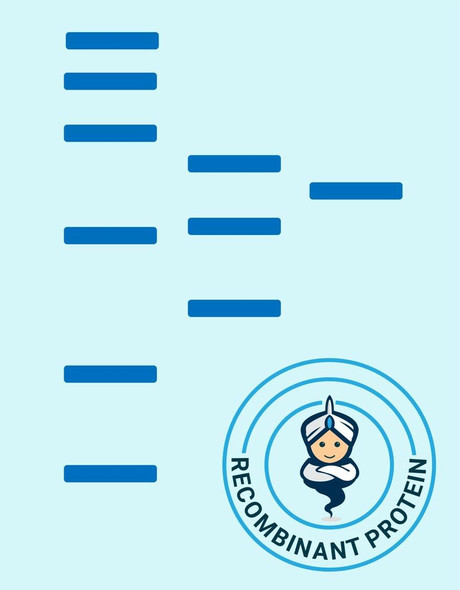Description
| Product Name: | Human AMH Recombinant Protein |
| Product Code: | RPPB2730 |
| Size: | 10µg |
| Species: | Human |
| Target: | AMH |
| Synonyms: | Anti-Muellerian hormone, AMH, Muellerian-inhibiting substance, MIS, MIF. |
| Source: | Escherichia Coli |
| Physical Appearance: | Filtered White lyophilized (freeze-dried) powder. |
| Formulation: | AMH filtered (0.4 �m) and lyophilized �in 1mM HCl and 5% (w/v) trehalose. |
| Solubility: | It is recommended to add 200�l deionized water to prepare a working stock solution of approximately 0.5mg/ml and let the lyophilized pellet dissolve completely.�AMH is not sterile! Please filter the product by an appropriate sterile filter before using it in the cell culture. |
| Stability: | Store lyophilized protein at -20°C. Aliquot the product after reconstitution to avoid repeated freezing/thawing cycles. Reconstituted protein can be stored at 4°C for a limited period of time; it does not show any change after one week at 4°C. |
| Purity: | Greater than 95.0% as determined by SDS-PAGE. |
| Amino Acid Sequence: | MKHHHHHHAS AGATAADGPC ALRELSVDLR AERSVLIPET YQANNCQGVC GWPQSDRNPR YGNHVVLLLK MQARGAALAR PPCCVPTAYA GKLLISLSEE RISAHHVPNM VATECGCR |
Anti-Mullerian Hormone also known as AMH is a member of the TGF-beta family. AMH is a glycoprotein which is produced by the Sertoli cells of the testis, causes regression of the Muellerian duct. AMH inhibits the growth of tumors derived from tissues of Muellerian duct origin. Moreover, AMH participates in Leydig cell differentiation and function in addition to follicular development in adult females.
AMH Human Recombinant produced in E. coli is a single, non-glycosylated polypeptide chain (a.a 452-560) containing 118 amino acids including a 9 a.a N-terminal His tag. The total molecular mass is 12.8kDa (calculated).�
| UniProt Protein Function: | This glycoprotein, produced by the Sertoli cells of the testis, causes regression of the Muellerian duct. It is also able to inhibit the growth of tumors derived from tissues of Muellerian duct origin. |
| NCBI Summary: | This gene encodes a secreted ligand of the TGF-beta (transforming growth factor-beta) superfamily of proteins. Ligands of this family bind various TGF-beta receptors leading to recruitment and activation of SMAD family transcription factors that regulate gene expression. The encoded preproprotein is proteolytically processed to generate N- and C-terminal cleavage products that homodimerize and associate to form a biologically active noncovalent complex. This complex binds to the anti-Mullerian hormone receptor type 2 and causes the regression of Mullerian ducts in the male embryo that would otherwise differentiate into the uterus and fallopian tubes. This protein also plays a role in Leydig cell differentiation and function and follicular development in adult females. Mutations in this gene result in persistent Mullerian duct syndrome. [provided by RefSeq, Jul 2016] |
| UniProt Code: | P03971 |
| NCBI GenInfo Identifier: | 313104218 |
| NCBI Gene ID: | 268 |
| NCBI Accession: | P03971.3 |
| UniProt Secondary Accession: | P03971,O75246, Q6GTN3, |
| UniProt Related Accession: | P03971 |
| Molecular Weight: | |
| NCBI Full Name: | Muellerian-inhibiting factor |
| NCBI Synonym Full Names: | anti-Mullerian hormone |
| NCBI Official Symbol: | AMH�� |
| NCBI Official Synonym Symbols: | MIF; MIS�� |
| NCBI Protein Information: | muellerian-inhibiting factor |
| UniProt Protein Name: | Muellerian-inhibiting factor |
| UniProt Synonym Protein Names: | Anti-Muellerian hormone; AMH; Muellerian-inhibiting substance; MIS |
| Protein Family: | Muellerian-inhibiting factor |
| UniProt Gene Name: | AMH�� |






